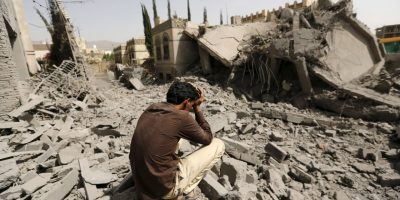Curbing Participation: The US Congress and Yemen

In recent times, there hasn’t been much cheery in the power circles of Washington. The US is gradually finding itself unmoored and floating from international agreements at a dizzying rate. Its president is cool-mad distant, self-serving and occasionally clenching in peculiarity. And the traditional buffet room of conflict continues to be stacked with US interests and US armaments, armaments sales and exchanges.
Last week, however, activity of a different sort took place. The House of Representatives, often asleep at the wheel of history, arose from their ignorant slumber. The issue of concern was the war in Yemen, where the US-backed Saudi-UAE effort against the Houthi-Saleh alliance continues its blood-soaked merry way.
Yemen has every reason to be on the US radar, though how if filters through to the body polity is something else. A Navy SEAL was lost in a raid against al-Qaida in the Arabian Peninsula as one of the first authorised foreign acts of engagement by President Donald Trump. It was a raid sizzling with some notoriety, not least because it cost the lives of 8-year-old Nawar al-Awlaki and involved the actual physical deployment of US boots on the ground.
The range of interests at play in the small country is bewildering: the Saudis on the one hand, pushing for their case for the overthrown Sunni government; the Iranians on the other, vicariously, and actively, supplying their Shia Houthi counterparts; and the US itself, keen on focusing on the bubbling fundamentalists of al-Qaida.
Congress has shown varied degrees of interest in the conflict, even if has been tinged with ample amounts of disingenuousness. Blocking the Trump administration’s efforts to cut US humanitarian assistance was certainly laudable. Even better was the appropriating of $1 billion of additional aid to the beleaguered state.
But what is given with one pure washed hand is taken away with the other grubbier one, notably in terms of allowing the munitions and equipment for the conflict to continue. US arms exporters, as Trump has made so clear, will not be denied.
US representatives saw their chance to make a further contribution to the debate with amendments to the annual National Defence Authorisation Act (NDAA) on the subject of support for Riyadh. Rep. Ro Khanna from California was keen to cut the funding line to refuelling coalition aircraft, while also calling for an inspector general report on the possible perpetration of war crimes by the coalition. That very fact would bar the continued supply of air-to-ground munitions.[1]
Rep. Warren Davidson (R-Ohio) also advanced an amendment forbidding US military action in Yemen that does not fall within the 2001 Authorisation for Use of Military Force Against Terrorists (AUMF). The motivation behind this legislative measure should, technically, be a non sequitur, given the fact that US participation in Yemen is not, in any case, authorised by the AUMF with the one caveat about operations against al-Qaida. But spelling out the obvious is such an important feature of these political engagements, a back hand confession of confused illegality.
There is, at least, some awareness about the indispensable nature of Washington’s backing to the Kingdom of Saudi Arabia. “The Saudis,” noted Connecticut Democratic Sen. Chris Murphy, “simply could not operate this bombing campaign without us. Their planes can’t fly without US refuelling capacity.”[2]
Senator Murphy, at the very least, notes the gruesome fact that American largesse and Yemeni citizens share an inseparably bloody bond in the conflict. “There’s a US imprint on every civilian death inside Yemen that’s caused by the Saudi bombing campaign.” The munitions dropped have been US in provenance; intelligence was being shared and distributed between the Saudi-UAE grouping and US officials.
Since October, the Saudi-led coalition has proven particularly voracious in, of all things, the re-fuelling department. Washington has doubled the amount, while most of the bombers that have been fuelled by the US, according to Pentagon sources, are from the UAE.
The theme of the useless obviousness also tells with the Nolan amendment, advanced by the Minnesota Democrat Nolan which prohibits the deployment of US troops to the Yemen conflict. One thing to be said about this particular measure is that it would block the US refuelling of UAE and Saudi aircraft operating against targets in Yemen.[3]
Things are not looking for rosy for a mutilated Yemen, now in the grip of famine and a cholera outbreak that has affected tens of thousands. The terms of suffering are staggering for a state essentially on death row, with 18.8 million Yemenis needing humanitarian assistance. The point is further hampered by the partial aerial and naval blockade of the state imposed by the coalition.[4]
In what can only be regarded as the pale sick irony of the entire conflict, Saudi Arabia’s new crown prince, Mohammed bin Salman, was not only a key decision maker in pushing the Yemen conflict, but also an enthusiastic donor to UNICEF and the WHO’s anti-cholera efforts.[5]
This remains a conflict without end, violent in its circularity and contradictions. The one group that can truly be said to have done well in amidst the slaughter and disease is al-Qaida in the Arabian Peninsula. Their existence remains a siren call for the next haphazard US mission.
Dr. Binoy Kampmark was a Commonwealth Scholar at Selwyn College, Cambridge. He lectures at RMIT University, Melbourne. Email: [email protected]
Notes

